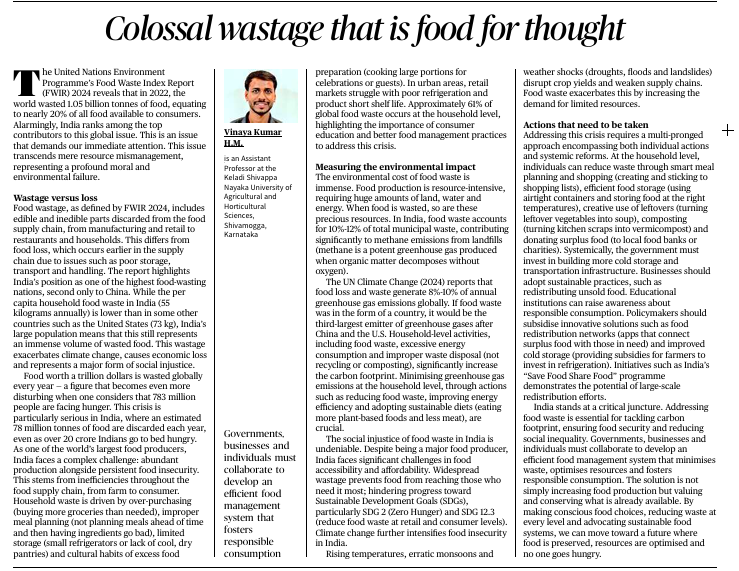Colossal wastage that is food for thought
Context:
Governments, business and individual must work together to create an effective food management system that reduce massive food waste and promotes responsible consumption
Introduction:
The United Nations Environment Programme’s Food Waste Index Report (FWIR) 2024 reveals that in 2022, the world wasted 1.05 billion tonnes of food, equating to nearly 20% of all food available to consumers. India ranks among the top contributors to this global issue.
Wastage versus loss:
- Food wastage: discarded edible and inedible parts from the food supply chain , including households, restaurants and retail.
- Food loss: food lost earlier in the supply chain due to inefficiencies.
India’s position in global food waste:
- Second largest food wasting nation after china
- Households food waste per capita : 55KG annually
- 78 million tonnes of food discarded every yearOver 20 cr indian go to bed hungry
Key causes of households food waste:
Cause :
- over purchasing : buying more groceries than needed
- Poor meal planning: not planning meals properly ,leading to spoilage
- Storage limitation : small refrigerators,lack of cool or dry storage
- Cultural practice: cooking large portions for guests or celebrations
Retail and urban market challenges:
- Poor refrigeration and short shelf life lead to high food spoilage
- Around 61% of global food waste happens at the households level,emphasizing the need for consumer awareness and better food management
Impacts of food waste:
Environmental impacts:
- Food production requires vast amounts of land,water,and energy .wasting food means wasting these critical resources.
- Food waste makes up 10% to 12% of india’s total municipal waste ,leading to landfill overflow.
- Decomposing food in landfills releases methane , a powerful greenhouse gas that accelerates climate change.
- Food loss and waste contribute to 8-10% of global emissions.If food waste were a country ,it would be the third largest emitter after China and the USA.
Social impacts:
- Food inaccessibility: India produces plenty of food ,but wastge prevents it from reaching those in need.
- Large scale food waste coexists with widespreads hunger ,highlighting deep inequalities.
Climate change and food security in india:
Increased food wastage intensifies resource demand , making food security even more fragile.
Action that need to be taken:
What individuals can do:
- Smart meal planning and shopping
- Proper food storage
- Creative leftover use
- Food donations
What governments and businesses should do:
- Infrastructure investment: build more cold storage and improve food transportation
- Sustainable business particles:Encourages business to redistribute unsold food
- Educational awareness: schools and institution should teach responsible consumption
- Policy support: provide subsidies for food redistribution networks and cold storage solution
Successful initiatives:
India’s save food share food programme shows how large scale food redistribution can make a difference
Conclusion: India stands at a critical juncture. Addressing food waste is essential for tackling carbon footprint, ensuring food security and reducing social inequality. Governments, businesses and individuals must collaborate to develop an efficient food management system that minimises waste, optimises resources and fosters responsible consumption.


